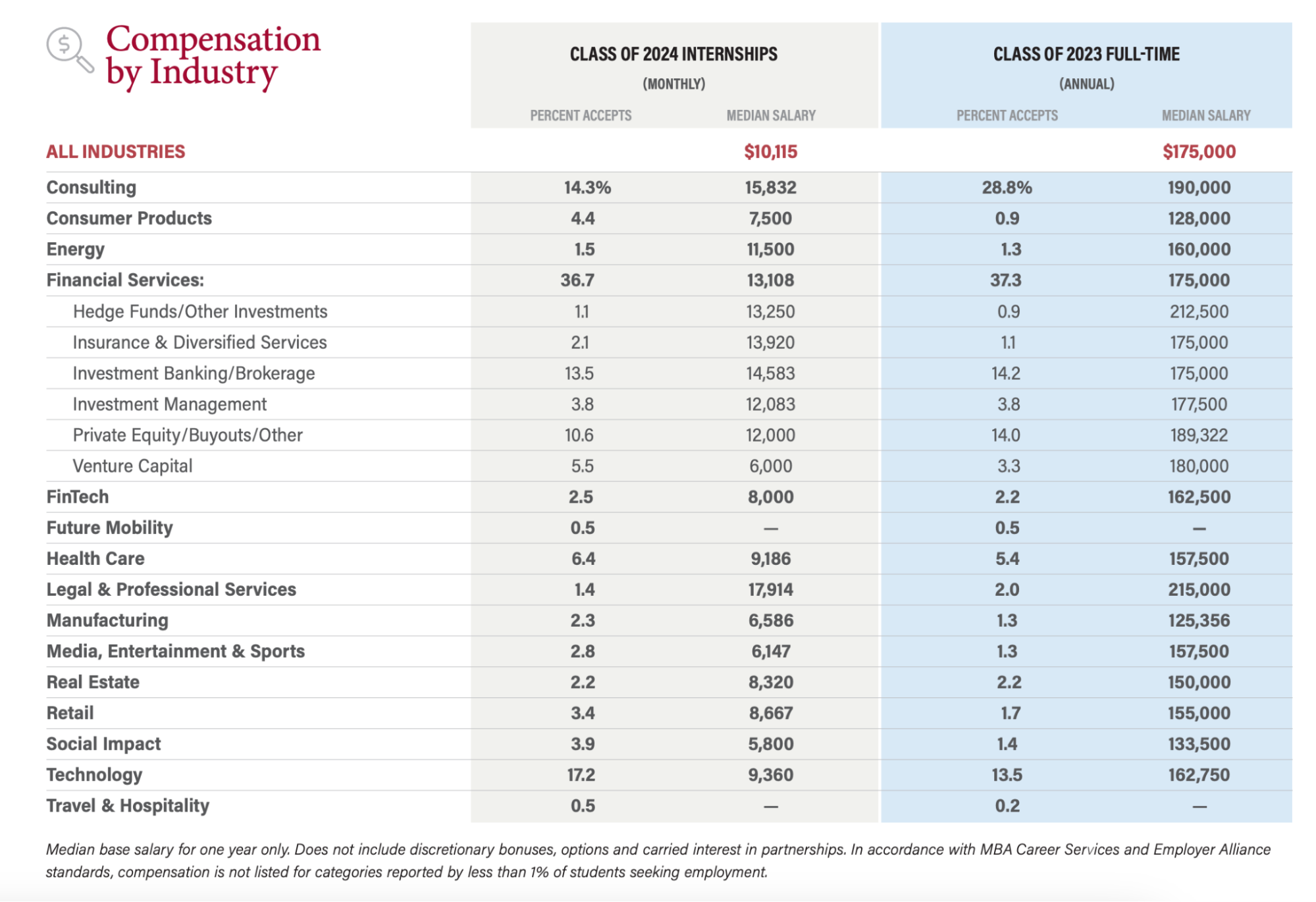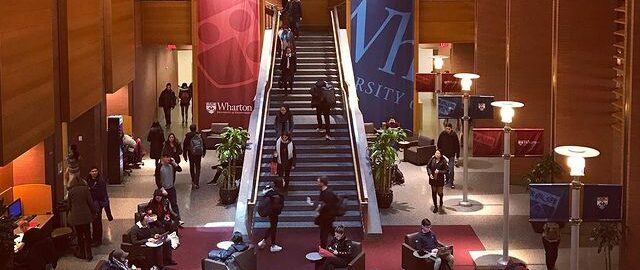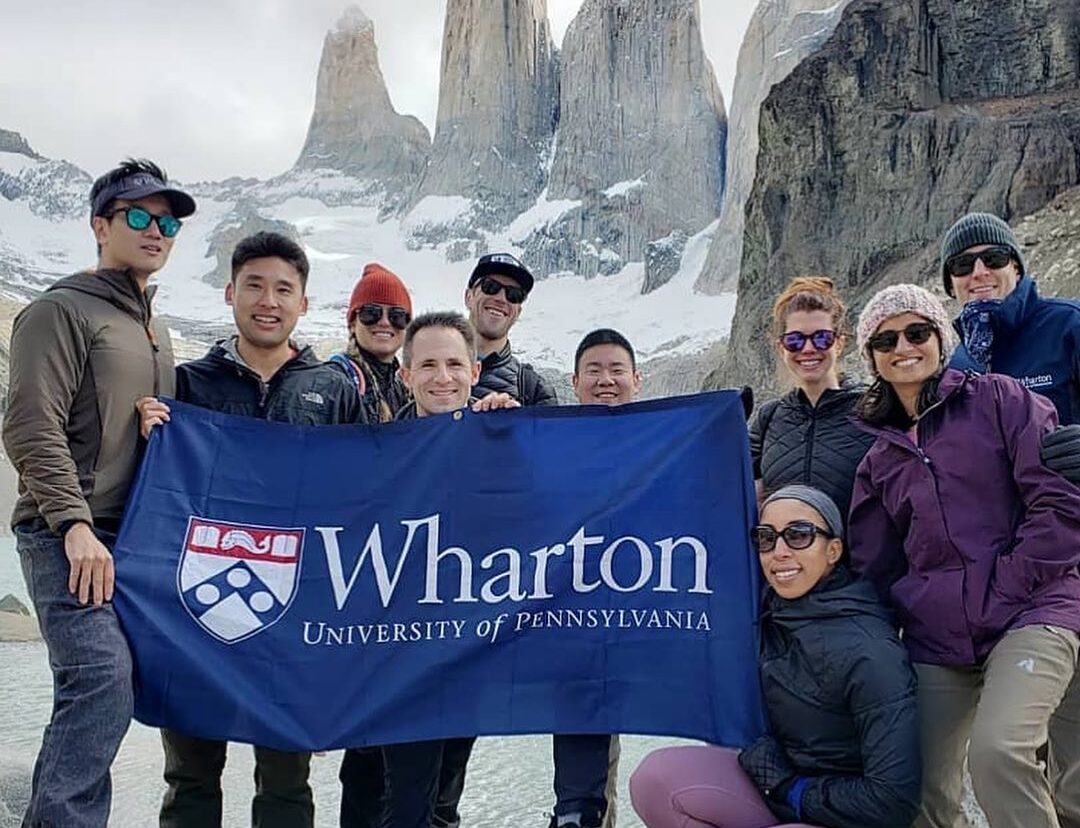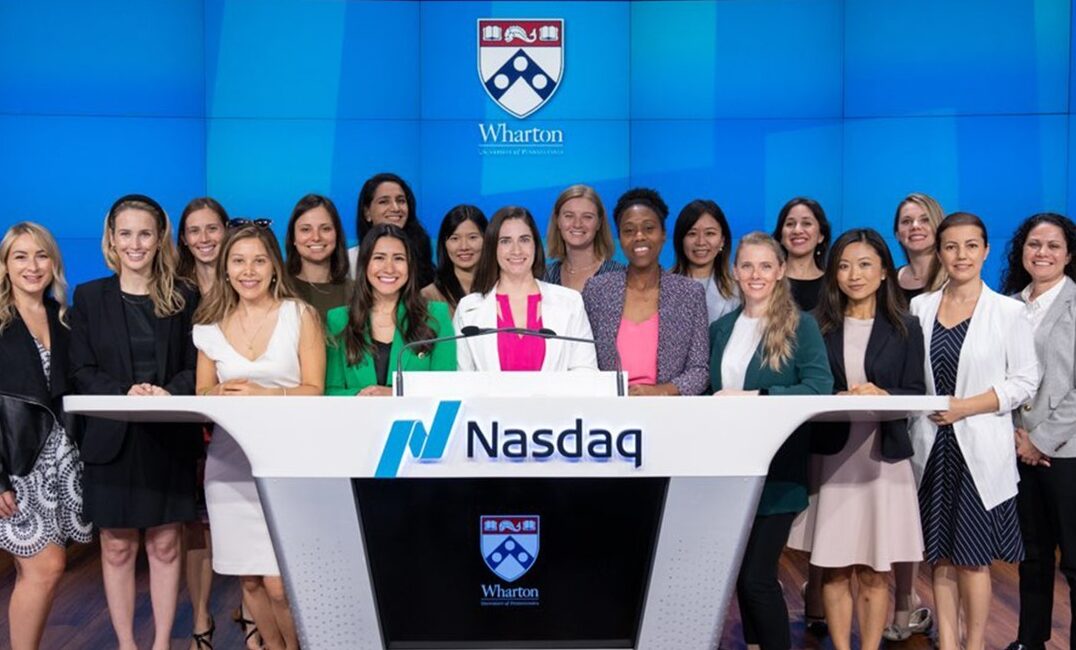Here is everything you need to get into Wharton.
This guide is designed to help you make a decision about whether Wharton is a good fit for you. In it, we give an overview of the school and its MBA program, including location, information about the MBA community, and ranking. We then give you a detailed look into the MBA course, including program offerings, extracurricular activities, and post-MBA opportunities.
This guide also includes a wealth of resources that will strengthen your Wharton application, including essay guidelines, interview advice, and letter of recommendation planning support.
We know this guide will be helpful for you and your MBA journey, and we wish you the best in your decision and application process! If you have any questions after reading, please feel free to contact us.
School and Program Overview
Location: Philadelphia, Pennsylvania
Located on the University of Pennsylvania’s campus, Wharton is in the center of Philadelphia, the sixth-largest city in the US. Attending and living near Wharton means that you will have a good balance between urban opportunities and access to others in academia.
Philadelphia is a particularly diverse city with a range of social and cultural opportunities. It is also just a train ride away from other East Coast cities like New York, Boston, and Washington D.C. Additionally, Philadelphia and Wharton offer a wide range of academic opportunities and events – in fact, Philadelphia has the second-largest concentration of universities and colleges in the U.S.
Philadelphia has a high standard of living per dollar, so living costs are not as expensive as they can be in other American urban settings. Off-campus apartments can cost anywhere from around $1000 to $1900 per month. Wharton also provides on-campus housing options, with apartments costing anywhere from $1,000 to $2,000 per month.
Overall, Wharton’s location is one full of opportunities and unique experiences, but you will have to reflect on whether an urban experience matches your needs and desires.
Wharton’s Community
Wharton is an innovative, collaboratively-minded university with a highly challenging yet highly collaborative approach to business education. As the Wharton admissions team says, “Our mission is to develop leaders who act with a deeper understanding of themselves, their organizations, and their communities, and contribute positively to the growth of each.”
 Photo courtesy of @whartonschool on Instagram
Photo courtesy of @whartonschool on Instagram
Wharton tends to value students who demonstrate a collaborative personality, leadership potential, global mindset, and ability to think outside the box and innovate. As the school becomes increasingly focused on social impact, they have even decided to offer a loan-forgiveness program for graduates employed in the nonprofit or social sector. Additionally, the Nonprofit Board Fellows program allows students to leverage their skills to advise a local nonprofit.
Class Size and Demographics
Out of 6,194 applicants for the Class of 2025, 874 were admitted and accepted spots at Wharton. With a relatively large class size, Wharton puts students into cohorts of 70 that take all core courses together, making the social experience easier to navigate.
50% of Wharton’s Class of 2025 are women, and 11% are LGBTQ. The demographics of American students are listed in the chart below:

31% of Wharton’s Class of 2025 are international, hailing from 70 countries.
In general, Wharton tends to admit applicants with 5 years of work experience, although the range for the most recent class is 1-21 years. Most students came in from consulting backgrounds (27%), although a wide range of industries is represented.
The average GMAT score for the Class of 2025 was 728 and the average GRE was 162Q, 162V.
Tuition
Currently, the annual tuition at Wharton is $87,370. With fees, the annual cost of attendance increases. According to the Wharton website, “The first-year budget for the Wharton MBA Program is $124,476, which includes tuition and fees ($87,370), room & board ($26,028), books, supplies, health insurance, and additional personal costs ($11,078). Students are responsible for their own housing, meals, and course materials.”
 Photo courtesy of wharton.penn.edu
Photo courtesy of wharton.penn.edu
This number includes expenses for an individual, so plan more in your budget if you’re bringing a partner or family with you.
Note that Wharton has a range of fellowships that are offered based on merit. The fellowships cover the 2 years of attendance and range in terms of amount.
Finally, qualifying members of the US military are eligible for additional funding through the Yellow Ribbon Program.
Scholarships and Funding
Wharton offers a range of merit-based scholarships to help supplement these costs. All admitted students are considered for these scholarships based on their applications. Criteria for fellowship selection include unique personal qualities and background, academic achievement, exceptional professional development, and community involvement. Learn more about these scholarship opportunities here.
For information on how to get company MBA sponsorship, see our guide or visit this page.
To search for third-party scholarships available for MBA candidates, click here.
For US nationals seeking federal loans, visit the US government website for financial aid. For private loans, see this list to see what firms are offering the best rates.
For international students interested in loans, we recommend the following institutions: Mpower Financing, Juno, or Discover.
Program Length
Wharton’s MBA is a 20-month program. It is only offered as a full-time program, and there are no one-year options available.
Ranking
Across multiple ranking sources, Wharton is consistently placed at the very top. Financial Times has Wharton at #4 globally for all MBA programs, while it is ranked in 3rd place by US News.
Class Size
Out of 6,194 applicants for the Class of 2025, 874 were admitted and accepted their spots at Wharton. With a relatively large class size, Wharton puts students into cohorts of 70 that take all core courses together, making the social experience easier to navigate.
Employment Information
Another important consideration to make when deciding whether any business school is right for you is the MBA’s ROI – where graduates go and how well they succeed. You want to ensure that the investment you make in your MBA, both in terms of time and money, gets you the career boost you’re aiming for!
The first key indicator of the school’s preparation and reputation is how many students receive job offers immediately after graduation (this is usually within three months). Secondly is the median base salary, which shows the value that employers see in candidates as a combination of their previous experience and skills and knowledge gained during the MBA. Employers are willing to pay candidates more when they can trust that the MBA has provided them with solid leadership skills. We provide the median base salary for all MBA graduates, but we also recommend looking at Wharton’s latest employment report to see detailed post-MBA salary information for your industry.
You will also want to consider each school’s career services and any resources they offer to support your post-MBA success. Part of the investment you make towards your MBA includes ensuring that you are getting the help you need to prepare for interviews, salary negotiations, and network-building. We include information about Wharton’s career services below.
Key Statistics
Of those that sought employment after completing their MBAs in 2023, 97.2% received an offer within three months. The top two functions that graduates pursued were consulting (36%, median base salary of $190,000) and private equity/venture capital (18.1%, median base salary of $185,000).
 Photo courtesy of wharton.penn.edu
Photo courtesy of wharton.penn.edu
The median base salary for all graduates was $175,000.
91% of graduates received jobs in North America, 48.3% of them ending up in the northeast.
Employment Services and Resources
Wharton also offers excellent career services to support students and alumni in their post-MBA journeys. Wharton’s Career Management Center helps students create a customized career plan, develop their hard and soft skills, make strategic decisions, and achieve their career goals. Graduates also have access to the Center’s support.
Key resources that students and alumni can access are career and life design group workshops, personal career advising, and interview preparation. Wharton also provides employer networking events and a comprehensive job board for both students and alumni.
Is Wharton Right for You?
Now you’ve got the basics of what Wharton is all about. Before you read on to the details of Wharton’s MBA program, you may be wondering if the school is really right for you and your situation.

Our team here at Ellin Lolis Consulting is always excited to support our clients in deciding which MBA is right for you. From mapping out your business school brand and objectives to planning your visit to your top-choice schools, we get to know you so we can offer you the best support along each step of the decision-making process.
Learn more about our all-in consulting services here!
Academics at Wharton
Now you’ve got the basics of what Wharton is all about. Before you read on to the details of Wharton’s MBA program, you may be wondering if the school is really right for you and your situation.
Considering the fact that you can only do one MBA, choosing where to apply is the most important decision you will make during your application process.
Though there are many components to a successful business school application, it’s important to know what you want out of your MBA. One of the most important aspects of an MBA program is academics. After all, you’ll spend most of your time in the classroom, preparing for class, or studying for exams!
In this section, we go into depth about just what you can expect during your Wharton MBA.
Curriculum
Wharton’s MBA curriculum is focused on business fundamentals as well as leadership, communication, and analytical skills. The curriculum is simultaneously challenging and flexible according to students’ interests and objectives. Like other MBA programs, students must take core courses and electives, but what makes Wharton unique is that students are required to choose a major to specialize in as well.
 Photo courtesy of @whartonschool on Instagram
Photo courtesy of @whartonschool on Instagram
After completing pre-term requirements, which include the course Foundations of Leadership and Teamwork, students are ready to complete year one. During the first half of the first year at Wharton, students focus on their core courses, which they take alongside a group of five or six classmates with whom they work closely on projects. Then, starting in the second half of the year, students start to personalize their studies through electives and extra/co-curricular activities.
Year two is when Wharton students really have the chance to customize their academic experience through more electives and major-related courses.
Joint Programs
For students interested in studying at the intersection of business and other fields, there are many options available at Wharton – in fact, Wharton offers 13 joint or interdisciplinary degree programs, from healthcare management to social work. One of the most popular is the Lauder program, in which students also receive an MA in International Studies from UPenn.
Alternatively, MBA students can pursue a dual degree with two other partner schools. One option is the MBA/International Studies MA with the School of Advanced International Studies (SAIS) of The Johns Hopkins University in Washington, D.C., which prepares students to operate in both business and the international political environment. There are also options to pursue an MBA and MPA/MPP with Harvard Kennedy School, which is for students with an interest in crafting solutions for public problems across business, government, and policy.
Notable Faculty
Wharton has some of the biggest names in business as professors. Here are just a few of them.
Eric Bradlow is a statistician whose work has been published in the Journal of the American Statistical Association, Management Science, and the Journal of Marketing Research. He is known as an excellent and amicable teacher who can make topics like marketing research interesting.
Brian Bushee is an award-winning professor of accounting. His research focuses on the impact of information intermediaries on corporate disclosure decisions and on the stock market pricing of information. His articles have appeared in top-tier academic journals such as the Journal of Accounting Research, the Journal of Accounting and Economics, and Accounting Review.
Stuart Diamond has taught and advised on negotiation and cultural diversity to corporate and government leaders and to more than 40,000 people in 60 countries. He has also been the chief negotiation instructor for Google. His New York Times bestseller, Getting More: How To Negotiate To Succeed In Work And Life, has sold more than 1.5 million copies in 27 languages, was named by The Wall Street Journal’s career site as the #1 book to read for one’s career.
Adam Grant has been recognized as Wharton’s top-rated professor for seven straight years. As an organizational psychologist, he is a leading expert on how we can find motivation and meaning, and live more generous and creative lives. He has been recognized as one of the world’s 10 most influential management thinkers and Fortune’s 40 under 40. He is also the #1 New York Times bestselling author of 5 books and has been named among the year’s best by Amazon, Apple, the Financial Times, and the Wall Street Journal.
Pedagogy
Instruction style
In general, there are three primary teaching styles: case studies, experiential learning, and lectures. Wharton’s MBA combines all three. Depending on the class, professors may employ any combination of these approaches.
Given the Wharton faculty’s extensive involvement in key industries, real-world examples are often used as cases in the classroom, allowing students to learn from the best.
Additionally, there is a wide range of experiential learning opportunities available to Wharton students. This includes the McNulty Leadership Program, which develops participants’ leadership styles by analyzing and building on their strengths, and the Center for Leadership and Change Management, which provides practical experience with organizational leadership.
Labs
Wharton has a number of labs and research initiatives that allow students to pursue projects in their particular areas of interest during their MBA studies.
With over 20 different areas of focus, Wharton’s research centers and initiatives serve as a hub for exchange and study where faculty, students, and members of the business community come together to address pressing global business challenges. Centers include the AI for Business initiative, the Sol C. Snider Entrepreneurial Research Center, and the Wharton Social Impact Initiative.
There are also multiple labs available to Wharton students. The Venture Lab offers five pathways for students and alumni interested in exploring ideas and projects related to entrepreneurship and innovation. For those interested in analytics, there are multiple labs available, including the ESG Analytics Lab and the Forensic Analytics Lab. There is also the Wharton Credibility Lab, which aims “to make open research irresistibly easy to use by providing online platforms that make it simple for authors to post, and for readers to find and understand the information that makes published research more credible.” Lastly, Wharton’s Behavioral Lab provides the resources for students and faculty to better understand behavioral aspects of business and society.
International study programs
Apart from the international experience that all MBA students are immersed in due to Wharton’s diverse class, there are two main global study opportunities available.
First are the Global Modular Courses, where students spend a few days in locations across the globe to experience key issues and topics in their relevant contexts. Courses are conducted in an intensive workshop format and have taken place in countries like Brazil, Israel, and the UK.
Next is the Global Immersion Program, which provides a high-level survey of the economic, cultural, and geopolitical drivers behind economically important regions throughout the world. Students then travel to the country to experience it firsthand.
 Photo courtesy of @whartonschool on Instagram
Photo courtesy of @whartonschool on Instagram
There are also a number of semester-long international exchange programs that take place at 17 partner schools across 15 countries, from Australia to Italy.
Networking and Extracurricular Activities
The quality and extent of any business school’s community and network are key to assessing how the MBA will support your goals and objectives. While the MBA’s academic offerings are certainly one of the most important considerations, the influence and support of others connected to the school are one of the most influential aspects of getting an MBA.
In clubs and extracurricular activities, you will meet others who can expand your perspectives, give you innovative ideas, and potentially become future business partners. When exploring each school’s extracurricular opportunities, see whether there are activities that align with your goals, values, skill gaps, or general interests.

Photo courtesy of @whartonschool on Instagram
As for the school’s networks and alumni community, some programs have stronger connections than others. You will want to consider whether the school has good connections to the regions and/or industries that you are aiming for and whether or not alumni networks exist where you are headed post-MBA. Not only will this be a chance for you to stay connected after graduation, but it can also get you lifelong career support and opportunities.
Extracurricular Activities and Clubs
With plenty of student-led clubs and extracurricular activities available at Wharton, there are many ways to refine leadership, networks, and skills during the MBA.
Whether you are interested in networking with others from your region or social group (e.g., Brazil Club, India Club, Wharton Women in Business), exploring your industry/background further (e.g., Family Business Club, Global Impact Consultants, Education Club), or simply finding others with similar personal interests (e.g., Photography Club, Storytellers, Wine Club), there are certainly a number of clubs that fit your profile and objectives.
Networking and Alumni Opportunities
In addition to experiencing Wharton’s tight-knit student community, MBA students and grads have access to the school’s one-of-a-kind alumni community. Wharton’s alumni network has more than 90,000 members in 153 countries. Students have the chance to interact with alumni through opportunities like an alumni mentoring program, career panels, alumni club receptions, and student conferences.
 Photo courtesy of @whartonschool on Instagram
Photo courtesy of @whartonschool on Instagram
Whether you are a student or an alumnus, you also have access to the Wharton Global Clubs Network, which consists of independent, volunteer-driven, and self-sustaining networking organizations that interact and engage with the Wharton School to help make real the collective vision of offering top-quality programming, communications, and engagement among the student, faculty and staff communities and the broader global alumni communities.
What Makes Wharton Special?
Apart from being a consistently well-ranked school with an excellent reputation among employers, there are a few key aspects that make Wharton unique:
- Excellence in finance and analytics: Wharton has a reputation as “the finance school,” given the school’s rigorous curriculum focusing on these tops and the relevant data analysis that drives Wharton Finance. Learning is focused on data-driven decision-making, which prepares pragmatic business leaders in a wide range of fields, even those beyond finance.
- Student involvement: Wharton is known for its many clubs and extracurricular activities available to students. It’s an expectation that students get involved in the Wharton community, which constantly molds the experience for current and future students.
- Leadership development: Building leadership skills is a core focus of the Wharton MBA, as is illustrated by the wide range of leadership development opportunities. For example, the Center for Leadership and Change Management, which focuses on cutting-edge research and practical experience, is a key aspect of Wharton’s leadership program. Additionally, Leadership Ventures are a popular leadership offering and combine experiential learning and global exposure via activities like trekking and rock climbing.
Wharton resources to help you get admitted
Now that you know just about everything there is to know about Wharton and its opportunities, you may be considering applying. Luckily, our expert team at Ellin Lolis Consulting has a wealth of Wharton-specific resources to make your application stand out and succeed. We’ve compiled them below:
Wharton Essay Analysis
Receiving thousands of applications per year, and with an acceptance rate of 14.1%, Wharton is a highly selective MBA program.
This guide, which includes tips from our expert essay editing team, will help you use your Wharton admissions essays to stand out. You’ll find an analysis of who Wharton is looking for, the essay questions, and what to (and not to!) do. We’ve also included sample essays. All in all, using this guide will ensure you give your Wharton application your best shot.
Wharton Team Based Discussion Prep
Wharton’s Team Based Discussion (TBD) is a requirement for all students invited to interview and is an opportunity for students to show their collaboration and leadership skills.
Though the Team Based Discussion (TBD) might sound daunting, by preparing in advance and developing a clear game plan for your session, you can minimize your anxiety and ensure you perform at your best. This guide will help you fully understand and prepare for Wharton’s TBD.
Additional resources to help you secure your spot
Looking for even more resources to ensure you get into Wharton?
Our MBA Resource Center is the perfect tool to start – or improve! – your Wharton application. In our MBA Resource Center, you get access to:
- Dozens more successful Wharton essays
- An exclusive essay brainstorming guide
- Letter of recommendation guides and templates
- Résumé templates
- Additional resources like interview mocks and sample interview essays
Our MBA Resource Center is the tool you need to turn an average application into an outstanding application that earns you a spot at Wharton!
Our Clients Get Admitted To Wharton
If your eyes are set on Wharton, you may be wondering about how you’ll prepare and execute a successful application. As one of the most selective MBA programs out there, getting admitted to Wharton is no easy task. Luckily, Ellin Lolis Consulting is here to offer our comprehensive expertise to you.
From brainstorming your ideas for your essays to negotiating your scholarships, our all-star team ensures that you get exactly the support and guidance you need along every step of the application process.
Don’t just take our word for it – take a look at the following testimonials from some of our clients who were admitted to Wharton:
Landing a spot at Wharton is no easy task. Now is the time to make sure your accomplishments truly shine.
Ellin Lolis Consulting began with one mission: provide the best possible service to our clients and get them the best possible results. We know that applying for an MBA can be a difficult, long process, but our goal is to take away as much of the stress as possible by acting as your ally in the process.
So if you need much more than just a few comments on your essay but instead want focused help shaping how you present your life’s greatest hits to one of the world’s toughest critics, you can count on us.
That’s why we have a 98.9% success rate. We love digging deep into your story, finding what makes you unique, and sharing your accomplishments and why you belong at Wharton, all without losing your voice.
If you want our one-of-a-kind, expert support in getting admitted to Wharton, apply to work with us and let our award-winning team help you make an unforgettable first impression on Wharton’s admissions committee.
Additional MBA resources to help you secure your spot
If you want our one-of-a-kind, expert support in getting admitted to Wharton, apply to work with us and let our award-winning team help you make an unforgettable first impression on Wharton’s admissions committee.
Deciding and Planning
- How to Decide Where to Apply to Business School
- Your Complete Timeline for MBA Application Success
- How to Create Your Business School Brand
- When Should You Start Preparing Your MBA Application?
- MBA Application Rounds: When Should You Apply?
- 3 Key Ways MBA Consultants Help You Build a Better Application Strategy
Writing your Essays and Résumé
- Your Complete Guide to Writing Winning MBA Essays
- How to Choose Your MBA Essay Stories (webinar)
- How to Write an MBA Goals Essay that Lands You an Interview
- 3 Reasons MBA Consultants Are Critical When Identifying and Telling MBA Essay Stories
- How to Use Storytelling to Write Standout MBA Essays
- How to Highlight Uniqueness in Your MBA Essays
- How to Discuss Failures and Weaknesses in Your MBA Essays
- How to Write an MBA CV
Letters of Recommendation
- How to Choose the Best Recommenders for Your Application
- How MBA Consultants Can Help you Obtain Better Letters of Recommendation
- How to Secure MBA Letters of Recommendation
MBA Interview Prep
- How to Be an Interview Rockstar and Leave a Great Impression
- The 5 Toughest MBA Interview Questions and How to Ace Them
- 5 Critical MBA Interview Mistakes Non-native English Speakers Make (And How to Stop Making Them)
- Ask These Questions During Your MBA Interview
- 3 Key Ways MBA Consultants Can Help You Prepare for Your MBA Interviews
- The 3 Most Common MBA Interview Mistakes (and How to Avoid Making Them) (webinar)
After Getting Accepted
- You’ve Just Been Accepted to Business School! Now What?
- MBA Application Fundamentals: What To Do After You’re Admitted
Get expert help
We hope you have enjoyed this guide to the Wharton MBA.
I know that applying for an MBA can be a difficult, long process, but arming yourself with information about your top-choice programs, planning ahead, and finding your application ally can take away as much of the stress as possible in the process.
So, whether you need help developing your Wharton essay or guidance shaping how you present your greatest hits to one of the world’s toughest critics, you can count on my amazing team and me.
Real MBA Essays That Got People In
School-specific sample essays that got our clients accepted








